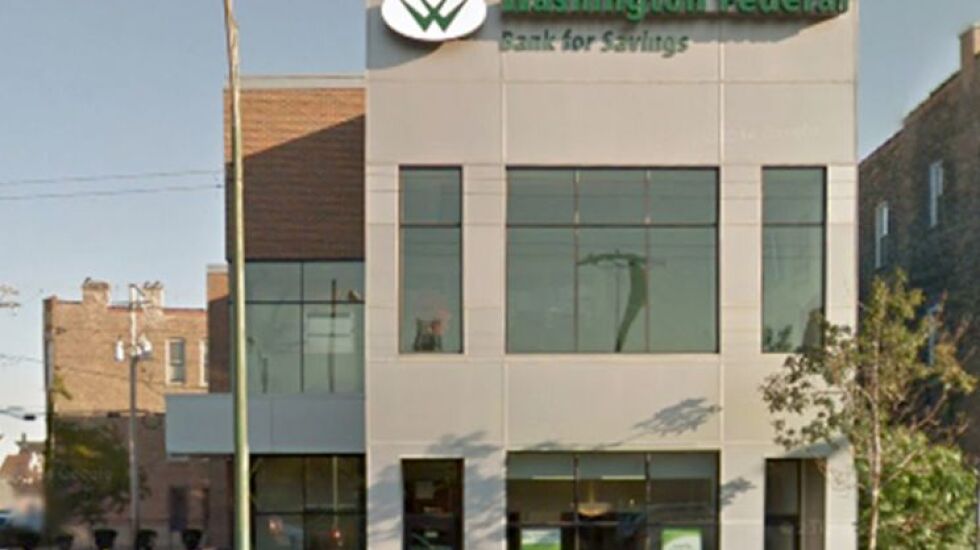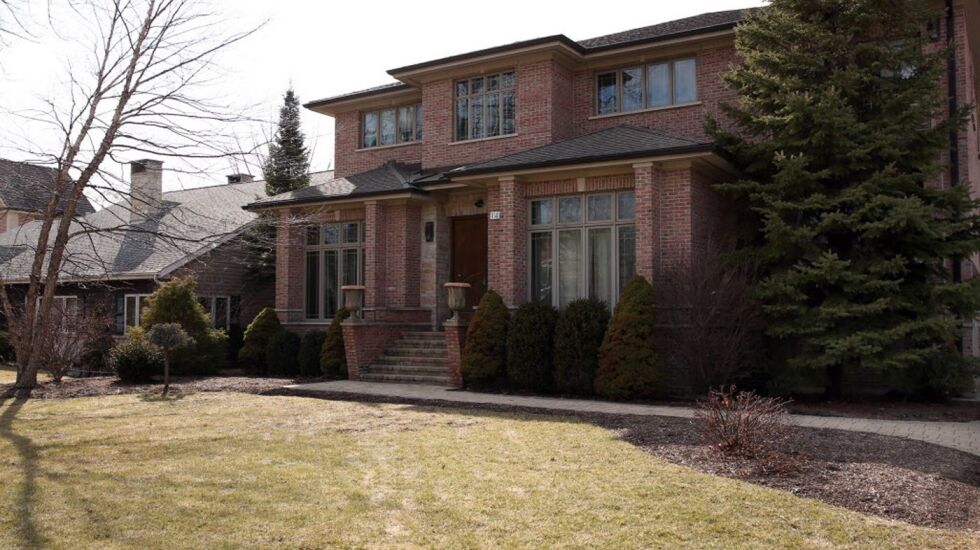
Since a Bridgeport bank was shut down in late 2017 over what federal authorities have described as a brazen embezzlement scheme involving the bank’s CEO, a key question has gone unanswered: Where did tens of millions of dollars in missing money go?
Now, sources tell the Chicago Sun-Times, authorities have determined that Marek Matczuk — one of the central figures charged in the ongoing criminal investigation into the failure of Washington Federal Bank for Savings — lost at least $1 million gambling at Chicago-area casinos. And they’re trying to determine whether the money he lost gambling came from the millions of dollars he never repaid the bank, the sources say.
Matczuk, 59, is a roofing contractor and handyman from Park Ridge. According to federal regulators, he had $13 million in delinquent loans from Washington Federal when suspended bank CEO John F. Gembara was found hanged in Matczuk’s bedroom shortly before the bank’s shutdown. The Park Ridge police and the Cook County medical examiner’s office said Gembara died by suicide, though his wife has questioned that finding.
Matczuk has been charged with siphoning $6 million from the bank as part of what prosecutors have said was a scheme in which Washington Federal handed out loans to favored insiders with no documentation, no collateral and no expectation the money ever would be repaid..
Matczuk lost $182,000 gambling at Rivers Casino between 2011, when the Des Plaines venue opened, and 2018, soon after Washington Federal was ordered closed, plus more than $800,000 at other Chicago-area casinos, according to knowledgeable sources.
Neither Rivers nor other casino operators would talk in any detail about the case.
“We believe the matter you are asking about involves multiple other operators and, as is our longstanding policy, we do not comment on pending litigation,” says Jeff Morris, a spokesman for Penn Entertainment, which runs casinos in Aurora, Joliet and East Chicago, Ind.
Another gaming company, Caesar’s Entertainment, which has casinos in Joliet, Elgin and Hammond, Ind., didn’t respond to questions.
A spokesman for the U.S. attorney’s office won’t comment.
Lawrence Hyman, Matczuk’s lawyer, says: “It would be wrong to conjecture that the earnings and losses he had from the [casino] boats were related in any way to the losses from the bank. One had nothing to do with the other. He’s been a working contractor all his life, built homes, been gainfully employed. His sources of money could have come from anywhere.”
Matczuk worked for a time as a handyman at the bank, court records show. At the time authorities shut down Washington Federal, he was facing a foreclosure lawsuit filed by another bank on his Park Ridge home that was trying to collect on a $1 million loan.
Sources say that, if federal officials can prove that any embezzled bank money was gambled away at casinos, they still wouldn’t be able to recover it unless they could show that casino operators knew the money had been embezzled.
Authorities say at least $31 million was pilfered from Washington Federal through crooked loan deals handed out over many years.

Washington Federal was a longtime institution on the South Side, where it was founded a century ago, primarily serving Polish immigrants in its early years, and run for decades by Gembara’s family, starting with his grandfather.
Its collapse was unusual. There were only seven other bank failures in the United States the same year.
As of June, the Federal Deposit Insurance Corp. said Washington Federal still had 2,379 uninsured depositors — about 2% of its depositors — and nearly $1.4 million in uninsured deposits. The government agency, which regulates banks, insures deposits up to $250,000.
The FDIC paid about $90 million to cover Washington Federal’s insured deposits, repaying those customers all or nearly all of the money they had deposited in the bank. It won’t say how much money it has recovered.
Matczuk is one of 14 people who have been charged in the Washington Federal fraud investigation. In a related case, former Ald. Patrick Daley Thompson went to prison for lying to federal regulators about the money he got from Gembara’s bank and cheating on his income taxes.
Probe ensnared bank workers, board members
Matczuk’s co-defendants include real estate developers Robert Kowalski, Boguslaw Kasprowicz, Miroslaw Krejza, five of the bank’s former employees and three of its former board members. One of those board members is Gembara’s sister Janice Weston. Another is William M. Mahon, a member of the Daley family’s political organization who was a deputy commissioner of the Chicago Department of Streets and Sanitation until he was indicted last year.
All are accused of helping Gembara, who was also the bank’s president, chairman of the board of directors and chief shareholder, embezzle the money.
According to prosecutors, the scheme began at least as early as 2004. They say some of the embezzled money was used to pay property taxes owed by Kowalski, Matczuk, Kasprowicz and Krejza, and some went to pay Gembara’s credit-card bills and to help him buy a Sea Ray 420 Sundancer luxury yacht.
Bank employees hid what was going on from banking regulators by falsifying documents, according to prosecutors.
Kowalski, whose sister and brother also have been charged, is expected to stand trial in February.
Prosecutors have said Gembara and Kowalski used some of the embezzled money in an elaborate but unsuccessful plan to develop property in the Fulton Market district in the West Loop.
Suspect had millions in delinquent loans
According to prosecutors, Matczuk got more than $2.8 million in unsecured loans from Washington Federal between January 2013 and Nov. 1, 2017. At the time of Gembara’s death and the closing of the bank, he had five outstanding mortgages from Washington Federal, for his $1 million Park Ridge home and three other residential properties.

Federal regulators ordered the bank board to suspend Gembara on Nov. 28, 2017.
Matczuk told the police he got several calls from Gembara on Dec. 1, 2017, in which he said Gembara told him “that he is in ‘trouble’ with his bank and needed a place to stay” for the weekend. They met in Wicker Park at a home Matcuzk was building with a loan from Gembara’s bank. According to Matczuk, Gembara left his car in the garage there, and the men drove together to Park Ridge.

Matczuk’s son told the police that, the following day, he drove Gembara to Home Depot in Niles to buy a green rope that he said Gembara told him he wanted to hang Christmas decorations from at his home in Palos Hills. Security footage shows they also ate hot dogs at the store.
On Dec. 3, 2017, the Matczuks said they checked on Gembara, unlocking their bedroom door and finding the banker dead in the main bedroom of the house, seated in a chair, with his glasses still on and the rope wrapped around his neck and around the railing of a spiral staircase.
There was no suicide note. Gembara’s wife Theresa Gembara received a one-word text message from her husband’s phone: “Bye.”
Two days later, banking regulators issued a report showing Matczuk and his wife owed Gembara’s bank $13.2 million on five loans from the past 17 years. They said the couple hadn’t made any payments on four of those loans for at least four years and concluded that $11.6 million of the loans were a total loss.
The delinquent loans included a $600,000 mortgage on the Park Ridge home.
On Dec. 15, 2017, federal regulators shut down the bank as investigators from the FBI, the Internal Revenue Service and other agencies kept working to unravel the years-long embezzlement scheme.
Weeks ago, federal prosecutors made an unusual admission that prompted U.S. District Judge Virginia Kendall to delay Kowalski’s trial until February. They had “mistakenly” failed to give Kowalski and the other defendants more than 100,000 documents from the FDIC because they assumed those were duplicate records they’d already been given, but they weren’t.







